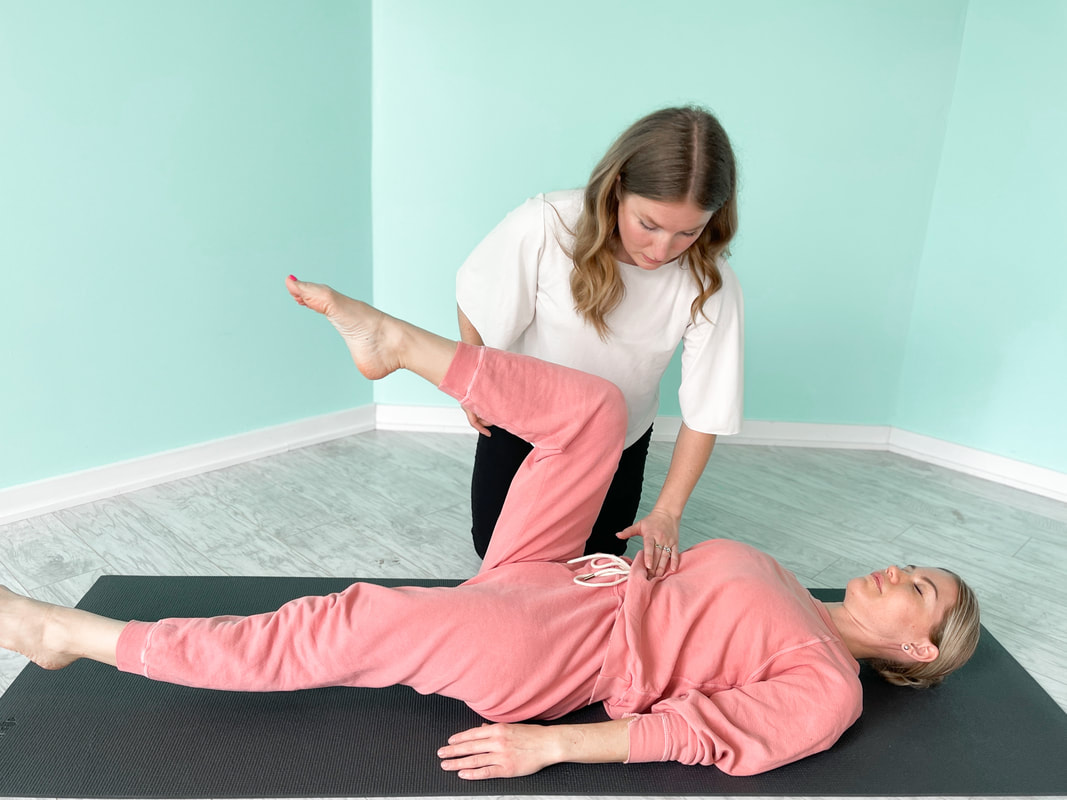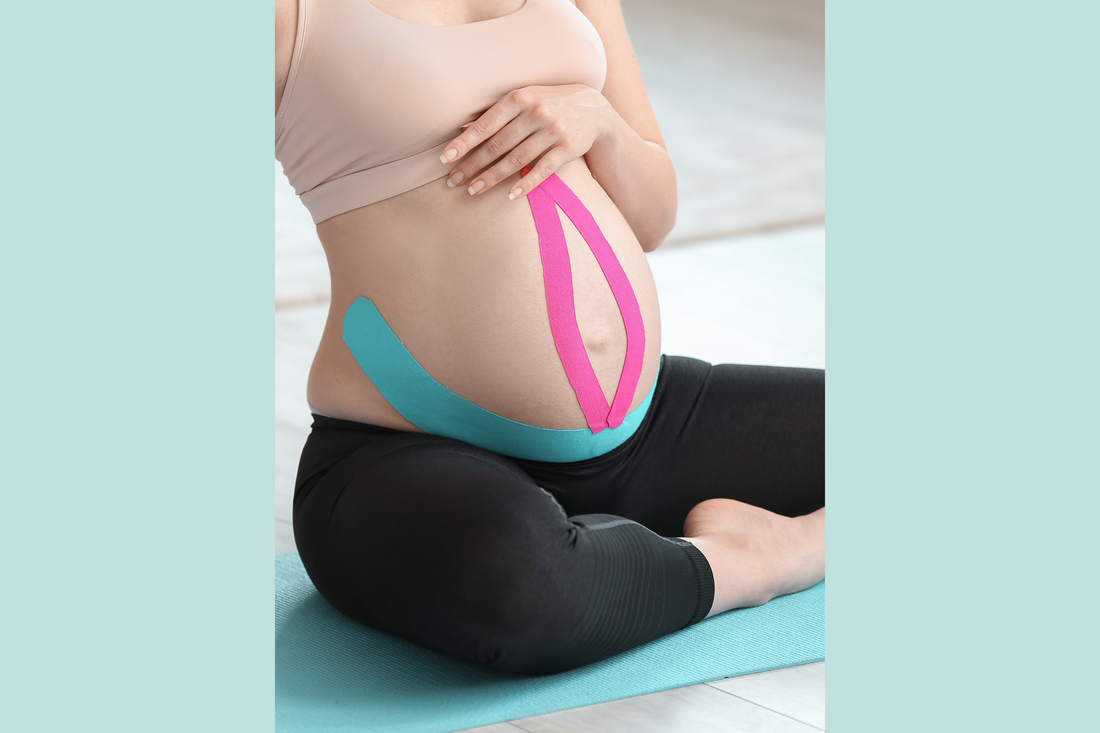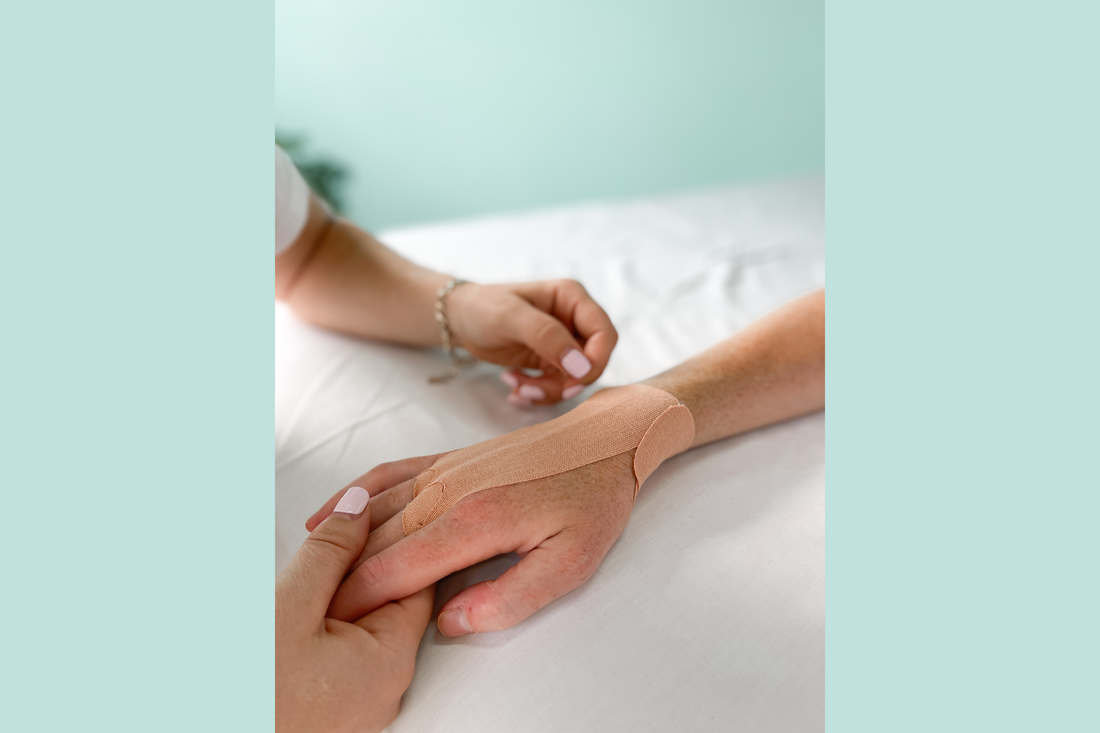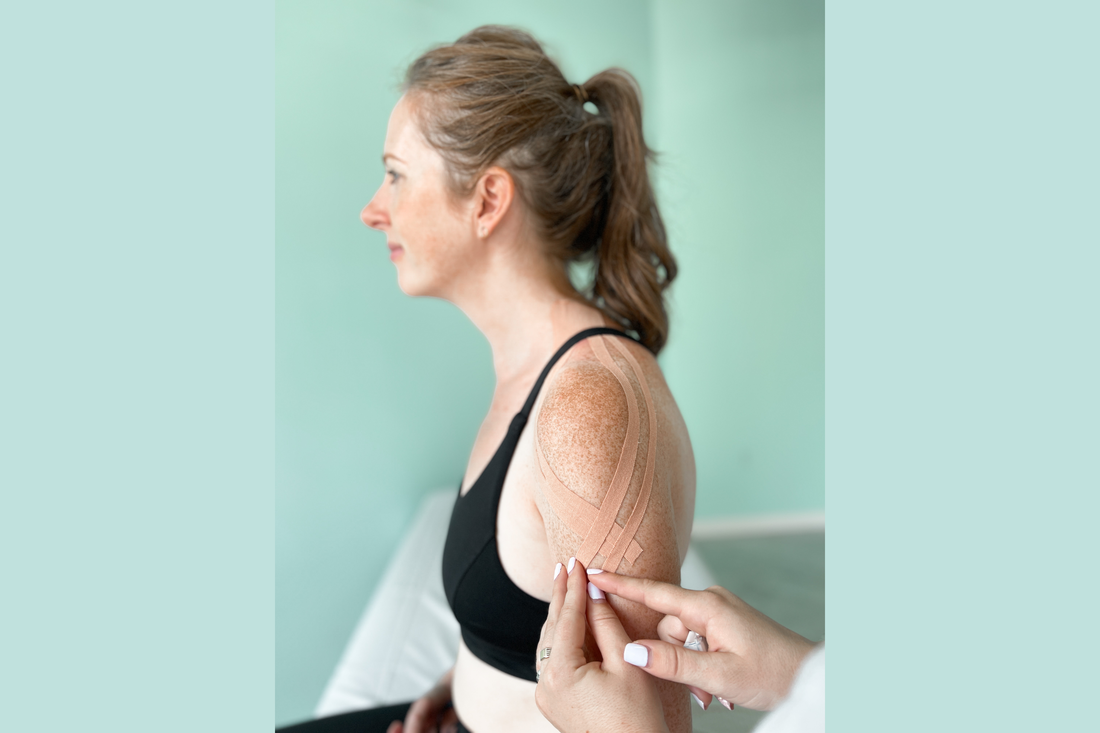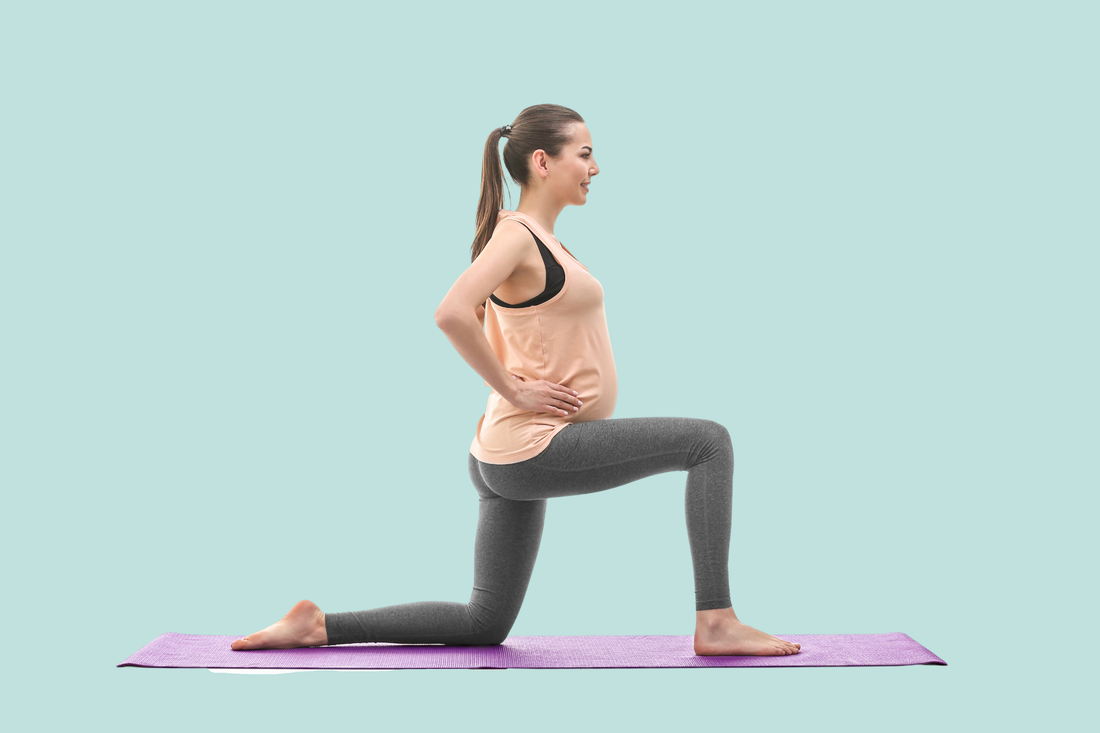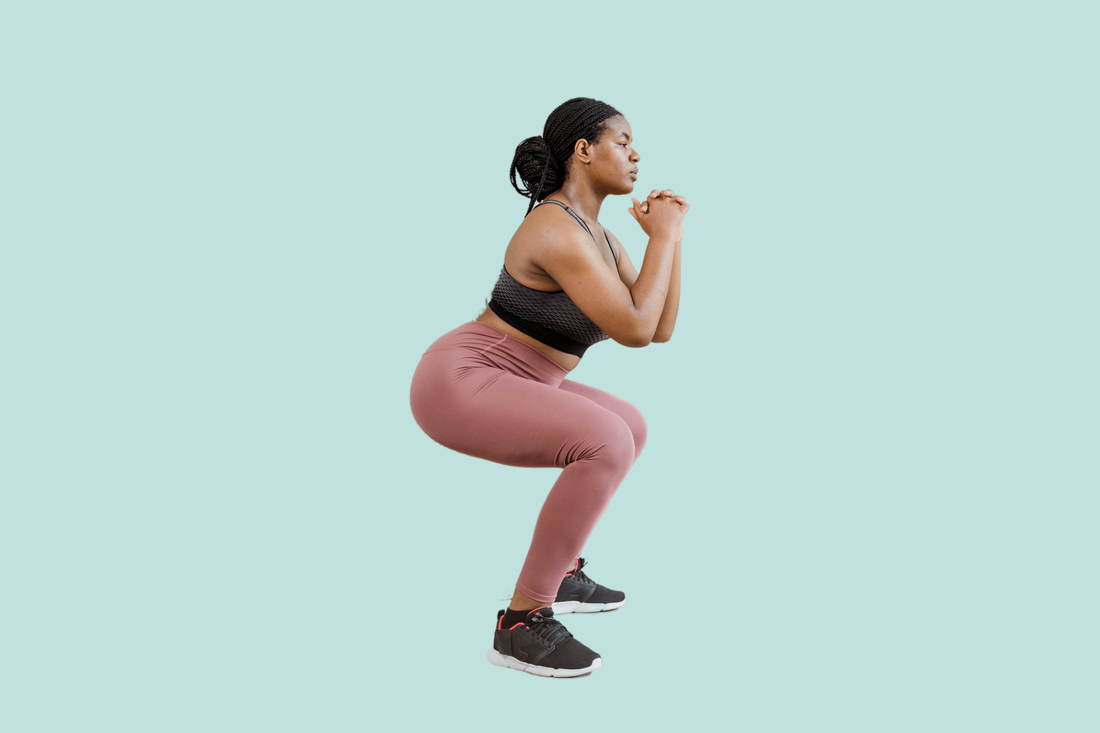Kinesiology
|
We offer in-clinic kinesiology including treatments for pain and rehabilitation, kin taping and Fascial Stretch Therapy appointments. These services are for pregnancy, postpartum, and continuing care into the years of caring for your family.
Kinesiologist Bethany Spiers works with clients in our clinic to rehabilitate pain, create and guide fitness routines and decrease stiffness and increase range of motion in the body. |
- Prenatal Kinesio Taping can help with a variety of concerns, aches, pains and physical symptoms. Some common techniques include edema and lymphatic drainage tape for swelling in the ankles. Another is low back pain, and our favourite - belly taping.
Prenatal Belly Taping can provide relief from heaviness, round ligament pain, and breathlessness associated with late 2nd and 3rd trimester pregnancy. Belly taping helps give the belly addition support which can improve comfort and decrease low back pain.
Kin taping offers excellent relief in these areas. Easily applied and lasts for days, the tape helps you feel held and supported. Book in for a pre/post kinesiology visit for this treatment. - The postpartum period comes with unique physical discomforts:
- Mother's wrist
- Mother's thumb
- Sore shoulders and neck from nursing/feeding baby
- Sore back from bending down to pick up baby
Kin taping offers excellent relief in these areas. Easily applied and lasts for days, the tape helps you feel held and supported. Book in for a pre/post kinesiology visit for this treatment.
A common kinesiology appointment during postpartum is the Breast Feeding Support Tape. This tape job is applied to the upper back and can provide postural support during breast feeding and activities of daily living. This tape job can help with chest tightness, shoulder pain, and posture related pains. - Some of the common general complaints that kinesio taping can help with are back pain, knee pain, shoulder pain, and hamstring strain.
Some common injuries/dysfunctions that respond well to taping include Acute & Chronic Shoulder Impingement Syndrome, Patella-Femoral Pain Syndrome, Biceps Tendinopathy, and more.
Kin taping offers excellent relief in these areas. Easily applied and lasts for days, book in for a general kinesiology visit for this treatment. - Congratulations on your pregnancy! Are you wondering where to start with your prenatal exercise regime? Are you experiencing aches and pains related to your pregnancy?
During pregnancy our bodies goes through significant changes, which changes the way we move, how we move, and places different loads on different muscles than we are used to.
Yoga Mamas Kinesiologist Bethany Spiers works with you in our clinic in two ways:
1. Addressing injuries or dysfunctions with assessment and treatment using mobilization, soft tissue massage and prescribed exercises. Kinesio taping is also used to help provide support of the growing belly as well as upper and lower back concerns.
2. Creating individualized prenatal fitness plans and guiding you through these exercises in an appointment. It commonly known that exercise throughout pregnancy has numerous health benefits but getting started can be difficult. Many people do these fitness routines at home - but some want the in-person guidance {and accountability} that our clinical appointments offer. - Congratulations on your baby! Are you wondering where to start with your postpartum exercise regime? Do you have questions about timing, intensity, or the types of exercises that will help you through this transition?
Your body has gone through a lot over the last nine months, and there are many ways we can help prevent common postpartum pains and rehabilitate any discomforts you may be experiencing.
Yoga Mamas Kinesiologist Bethany Spiers works with you postpartum in our clinic in two ways:- Addressing injuries or dysfunctions with assessment, treatment and exercise prescription.
- Creating individualized postpartum treatment plans to guide you through postpartum healing. These plans can help with a variety of concerns such as diastasis, prolapse, incontinence, and more. During the appointment you will be guided through your rehabilitation exercise protocol in a way that is safe, effective, and research informed.
- Why would the general population want to see a Kinesiologist?
There are many reasons why a Kinesiologist may be the right fit for you and your concerns. You may want to see a Kinesiologist if your injuries or dysfunctions require both active and passive rehabilitation protocols. That way, we can address the issue using both manual techniques (mobilizations) and rehabilitative exercise intervention within the same appointment.
Yoga Mamas Kinesiologist Bethany Spiers works with the general population in our clinic in two ways:
- Addressing injuries or dysfunctions with assessment assessment and treatment using mobilization, clinical exercise intervention, kinesiotaping, and more.
- Helping patients living with diabetes, thyroid, cancer, long COVID, or lifestyle related illness implement exercise protocol that is safe and effective. Exercise intervention can be effective in slowing the rate of disease progression, helping manage symptoms of various illnesses, and can help patients recover from many illnesses.
Frequently Asked Questions
What is Kinesiology?
Kinesiology is “the scientific study of human movement, performance and function” (coko.ca). Kinesiologists use evidence-based practice to prevent and rehabilitate injury, illness and disease. Kinesiologists are Regulated Health Care Professionals governed by the College of Kinesiologists of Ontario.
Are Kinesiologists covered by insurance?
Kinesiology services are not covered by OHIP, however some extended health insurance plans cover Kinesiology. If Kinesiology is not covered by your extended health insurance, or you do not have insurance, you can claim Kinesiology services on your annual taxes.
What happens in a typical Kinesiology appointment?
During an appointment you can expect your Kinesiologist to complete a thorough health history and generate rapport regarding your goals for the treatment. Your Kinesiologist will conduct an assessment which might include strength, flexibility, mobility, gait, blood pressure, or heart rate. After the assessment, your kinesiologist will discuss the findings of the assessment and generate a personalized treatment plan. The treatment plan will utilize both active (exercise) and passive (manual) therapies to improve movement, injury and dysfunction.
How can a Kinesiologist help with my pelvic floor?
Our Kinesiologist collaborates with our Pelvic Floor Physiotherapists (PFP) to best serve your needs. After completing an assessment with a PFP, the findings of the assessment will be communicated with our Kinesiologist. They will use this information to implement rehabilitative, preventative, and exercise based protocols.
Should I see a Kinesiologist before, during, or after pregnancy?
A Kinesiologist can assist you throughout preconception, pregnancy, and postpartum by implementing various preventative and rehabilitative protocols. During maternity, you may want to see a Kinesiologist to help prevent various ailments (such as diastasis, urge incontinence, stress incontinence, low back pain). Postpartum, you may want to see a Kinesiologist to help rehabilitate any issues you may be experiencing. A Kinesiologist can also help you modify your activities of daily living (such as lifting heavy groceries, picking up babies or toddlers, etc.) to guide you toward pain free movement.
Kinesiology is “the scientific study of human movement, performance and function” (coko.ca). Kinesiologists use evidence-based practice to prevent and rehabilitate injury, illness and disease. Kinesiologists are Regulated Health Care Professionals governed by the College of Kinesiologists of Ontario.
Are Kinesiologists covered by insurance?
Kinesiology services are not covered by OHIP, however some extended health insurance plans cover Kinesiology. If Kinesiology is not covered by your extended health insurance, or you do not have insurance, you can claim Kinesiology services on your annual taxes.
What happens in a typical Kinesiology appointment?
During an appointment you can expect your Kinesiologist to complete a thorough health history and generate rapport regarding your goals for the treatment. Your Kinesiologist will conduct an assessment which might include strength, flexibility, mobility, gait, blood pressure, or heart rate. After the assessment, your kinesiologist will discuss the findings of the assessment and generate a personalized treatment plan. The treatment plan will utilize both active (exercise) and passive (manual) therapies to improve movement, injury and dysfunction.
How can a Kinesiologist help with my pelvic floor?
Our Kinesiologist collaborates with our Pelvic Floor Physiotherapists (PFP) to best serve your needs. After completing an assessment with a PFP, the findings of the assessment will be communicated with our Kinesiologist. They will use this information to implement rehabilitative, preventative, and exercise based protocols.
Should I see a Kinesiologist before, during, or after pregnancy?
A Kinesiologist can assist you throughout preconception, pregnancy, and postpartum by implementing various preventative and rehabilitative protocols. During maternity, you may want to see a Kinesiologist to help prevent various ailments (such as diastasis, urge incontinence, stress incontinence, low back pain). Postpartum, you may want to see a Kinesiologist to help rehabilitate any issues you may be experiencing. A Kinesiologist can also help you modify your activities of daily living (such as lifting heavy groceries, picking up babies or toddlers, etc.) to guide you toward pain free movement.

